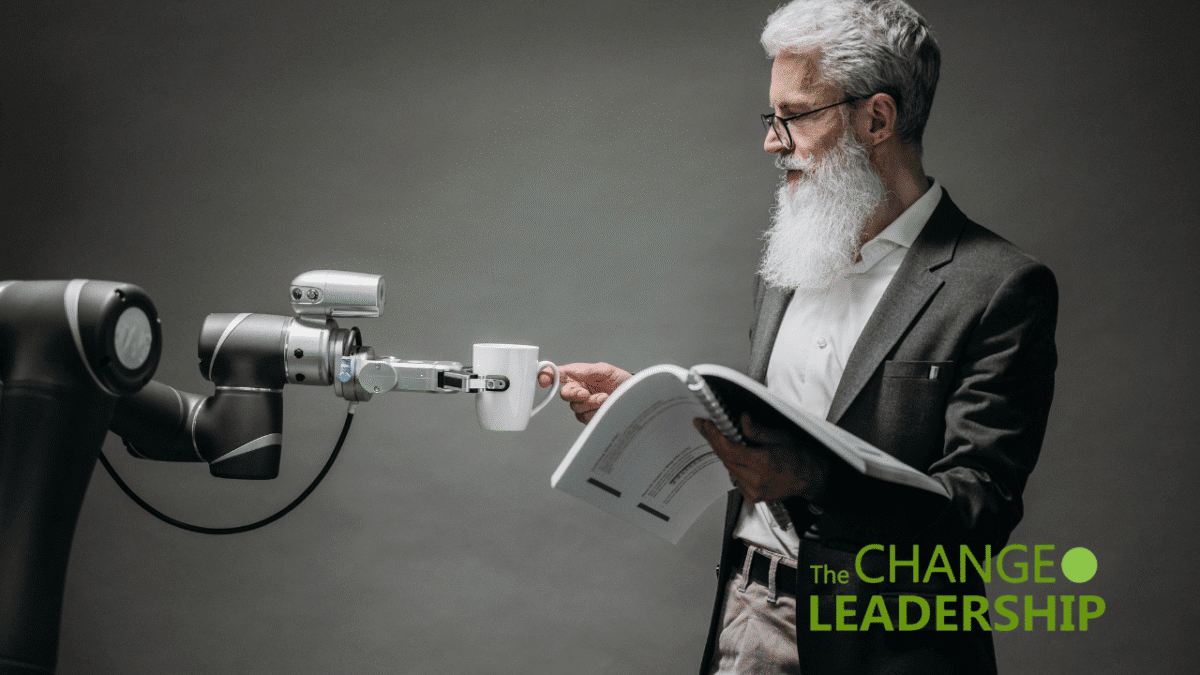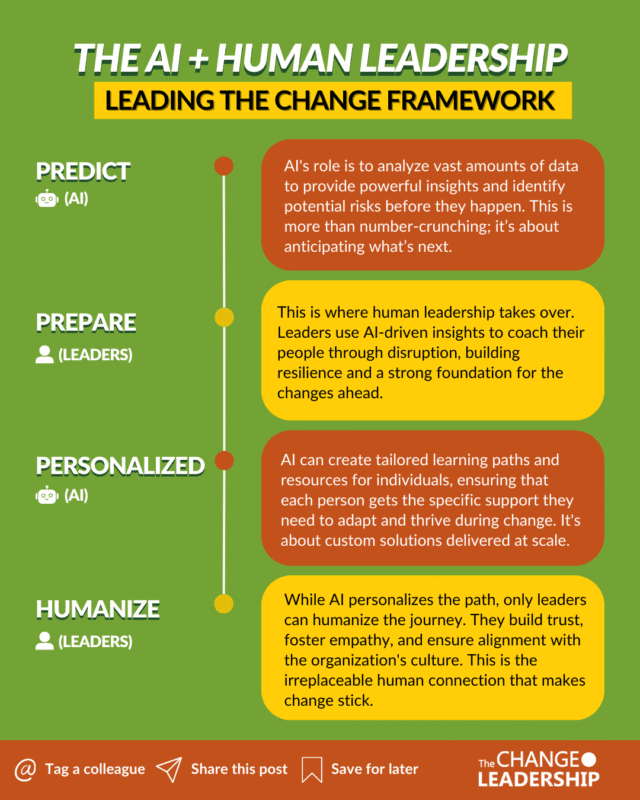AI and the Future of Change Leadership: Why Humans Still Matter More

AI won’t replace Change Leaders and Change Managers. But it will replace the ones who don’t evolve.
The pace of change is accelerating. Complexity is rising. Expectations from executives, employees, and stakeholders are higher than ever.
For organizations navigating change and transformation, AI is no longer optional. It is already reshaping how we plan, analyze, and execute change. But it’s also sparking one of the biggest questions in our field: What is the role of the human Change Leader in the age of AI?
The answer is simple: AI will never replace the human side of change: empathy, trust, coaching, culture. Instead, it will amplify the leaders who know how to harness it.
How Can AI Support Change Leaders?
AI is proving to be a powerful ally for change managers, senior leaders, project managers, HR, and transformation teams. When applied effectively, it can:
-
Predict risks before they escalate: Machine learning can flag patterns in adoption, sentiment, or resistance before they derail transformation.
-
Personalize support at scale: AI-driven tools can tailor communications and nudges to different stakeholders, based on their readiness or role.
-
Automate data-heavy tasks: From analyzing survey results to mapping stakeholder networks, AI can remove administrative burdens that slow leaders down.
In other words, AI can help you see further, move faster, and act smarter.
What Can’t AI Replace in Change Leadership?
Yet there are limits to what algorithms can achieve. AI cannot:
-
Build trust in uncertain times: Trust is earned through transparency, empathy, and credibility.
-
Coach a team through resistance or uncertainty: Navigating emotions and behaviours requires nuance only humans can provide.
-
Humanize the journey: Leading change is about stories, conversations, and meaning, not just data points.
-
Understand the cultural nuance of your organization: No model can fully grasp the unspoken dynamics that shape how people respond.
This is where the human side of leading and managing change becomes irreplaceable.
Why Human-Centred Skills Give Change Leaders an Advantage
Change becomes sustainable when AI does the heavy lifting, and humans do what only humans can. It also speeds up the process and can be a highly beneficial productivity tool.
The future belongs to leaders who combine AI-powered insights with human-centred leadership:
-
Empathy: Listening deeply and validating concerns.
-
Culture: Shaping values and behaviours that align with strategy.
-
Behaviour change: Coaching, reinforcing, and modelling new ways of working.
-
Connection: Inspiring people to believe in the purpose behind the change.
These are not “soft skills.” They are core leadership capabilities that drive adoption, resilience, and long-term transformation.
Why AI + Human Leadership Matters for Organizations Today
For Change Leaders, this means evolving your skillset: becoming fluent in both AI literacy and human leadership. Data alone won’t drive transformation, you must be able to interpret, translate, and act on it in ways that resonate with people.
For organizations, this means rethinking how you build capability:
-
Train leaders not only in change frameworks, but in building change leadership skills – adaptive leadership, emotional intelligence, resilience.
-
Equip teams with AI tools, while embedding the human behaviours that make change sustainable.
-
Recognize that AI is an enabler, not a replacement. The real differentiator is how people lead through it.
AI will never replace the empathy, culture, and behavioural influence that define great Change Leaders. But leaders who fail to adapt, who ignore AI altogether, risk being left behind.
The future of change is human + AI together. When AI does the heavy lifting, you’re free to lead with what truly matters: clarity, courage, and connection. Change Leadership skills are your superpower, and they are needed now more than ever.
Looking for change leadership training to equip your teams and organization with practical and future ready skills? Explore our Change Leadership Training and the ACMP-accredited Change Leadership Accelerator. These programs are designed to build capability, resilience, and confidence to lead change in real time. Learn more here.

Yvonne is a Change Management Strategist, Change Leadership Advocate, and Founder of The Change Leadership. With more than two decades of experience working with organizations to lead change, develop practical change leadership skills, and build real change capability beyond frameworks and performative transformation, Yvonne works with professionals, teams, and organizations globally to help them lead change with confidence in the face of continuous disruption. Connect with her on LinkedIn.





